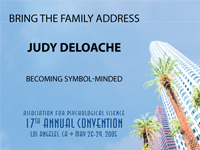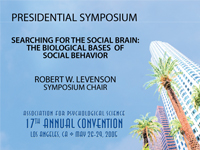Member Article
Conventional Experience: The APS Annual Convention Through an International Lens
When I started my research position at the University of Vienna in Austria, I was asked to get in contact with international research colleagues. Before then, I had only attended conventions in German-speaking countries, and this would not suffice. I started doing Internet research to try to get in contact with colleagues outside of Europe. And then I found it: The APS 17th Annual Convention. This had to be my first international convention!
I wasn’t sure what to expect: Would anybody talk to me? Would the convention meet my interests and could I learn something there? Would I get to know what research and the publication of research in the US is like? Would anybody be interested in my research?
On my first convention day, Thursday, I had the pleasure of meeting Paul W. Thayer by coincidence at lunch at the nearby shopping mall (this was even before the convention program had started!). He gave me an overview of the history and founding of APS and assured me that APS itself really focused on research. And then I realized: There was no problem making contact with other scientists.
The convention began for me with a workshop: “Introduction to Neuropsychology Assessment.” It took place in a family-like atmosphere and was most interesting. So, yes, the convention did meet my interests and yes, I really benefited from it. And this is the way it continued.
On Friday my program started with Frank Landy talking about “The Pursuit of Emotional Intelligence: A Cautionary Tale,” where I met Paul Thayer again, who introduced me immediately to Frank Landy with the words: “She’s from Vienna!” I have to admit, at that moment I felt a little bit “special.” During the talk I noticed that, contrary to my expectations, not just a listing of research results was offered, but rather a broad and critical survey of the efforts made in this field to date. After the talk an interesting discussion between Maureen O’Sullivan and Frank Landy started. The following sentences at this discussion will probably stay in my mind forever: Landy: “May I ask, why there was no further research with EI from you?” O’Sullivan: “I had a life!” [Editor’s note: this exchange was continuted with essays by Landy and O’Sullivan in the August 2005 Observer.]
Once again I was astonished at how easy it was to get in contact with other researchers: It just took a few words with Frank Landy to receive his promise of sending me the full paper via email — and I received the paper within a day. Then Maureen O’Sullivan listened to my research ideas and was able to offer valuable input to think about.
At lunch time I presented my poster. Like in Europe there were so many posters that most of the visitors just screened the headings by walking by slowly. But a few of them, interestingly enough most of them students, stopped and began to talk with me about my research. So, the question “Would anybody be interested in my research?” could be answered with: Yes, some interest was shown.
In the afternoon the APS Student Caucus presented “How to Get Published: Guidance from Journal Editors”. Maybe I just can summarize it in two sentences: “Never give up” (at least when you are invited to re-submit your paper) and “editors are only human (and they are under huge pressure), so interact with them with understanding and politeness.” At this point I could answer my question “Would I get to know what research and publication of research in the US is like?” I think I gained a good impression and insight on these topics.
Since my initial Internet research, I had been looking forward to the special event “Motion and Emotion: An Animated Dialogue”. Different trailers from Pixar movies were shown and commented on regarding the emotions of the characters. There is just one word to describe this event: Fun!
It was followed by another special event: “Inside the Psychologist’s Studio: Interview with Paul Ekman,” where not only the research itself but also the life of Paul Ekman was uncovered. As I was not familiar with the show to which the interview referred to (Inside the Actors Studio), I was assured by other colleagues that APS President Robert Levenson (as the interviewer) was very authentic!
On Saturday, the talk “Inside Emotion” by Kent Berridge managed to keep me totally awake, although I was not too familiar with this kind of research (physiological/neuroscience). The talk itself, and more importantly the research ideas, and conclusions were easy to follow.
In the afternoon, I took the opportunity to meet the “Champions of Psychology.” I have to admit that I did not know or recognize any of the champions sitting at the round tables. So it was just by accident that I sat down next to Judy DeLoache, but I certainly didn’t regret it! Unfortunately, the hour was over too soon. In the future I think this event should be longer.
Fortunately, I had the opportunity to talk to another champion after this event: Nancy Eisenberg talked to me and my colleague for half an hour and gave us advice for our research career.
Judy DeLoache concluded the convention on Saturday with her talk “Becoming Symbol-Minded.” By listening to her research ideas and results, and viewing the research objects — small children — by video, I honestly began to wonder if I should change my focus of interest, Judy DeLoache really seems to enjoy her research!
The Closing Reception, where I had a lot of fun with all the new colleagues I had met, was followed by the banquet in honor of Robyn M. Dawes, where a lot of anecdotes were told. After these two events, the convention was finally over for me.
So, what are my conclusions? It really was very valuable attending the APS convention. It was enjoyable, I received input for my research and I met a lot of interesting people.
If you are a student or a young scientist, go there! You can get in contact with other scientists, the convention itself is interesting, and you can benefit from it and receive valuable of input for your own research.
See you at next years 18th Annual APS Convention in New York!




APS regularly opens certain online articles for discussion on our website. Effective February 2021, you must be a logged-in APS member to post comments. By posting a comment, you agree to our Community Guidelines and the display of your profile information, including your name and affiliation. Any opinions, findings, conclusions, or recommendations present in article comments are those of the writers and do not necessarily reflect the views of APS or the article’s author. For more information, please see our Community Guidelines.
Please login with your APS account to comment.